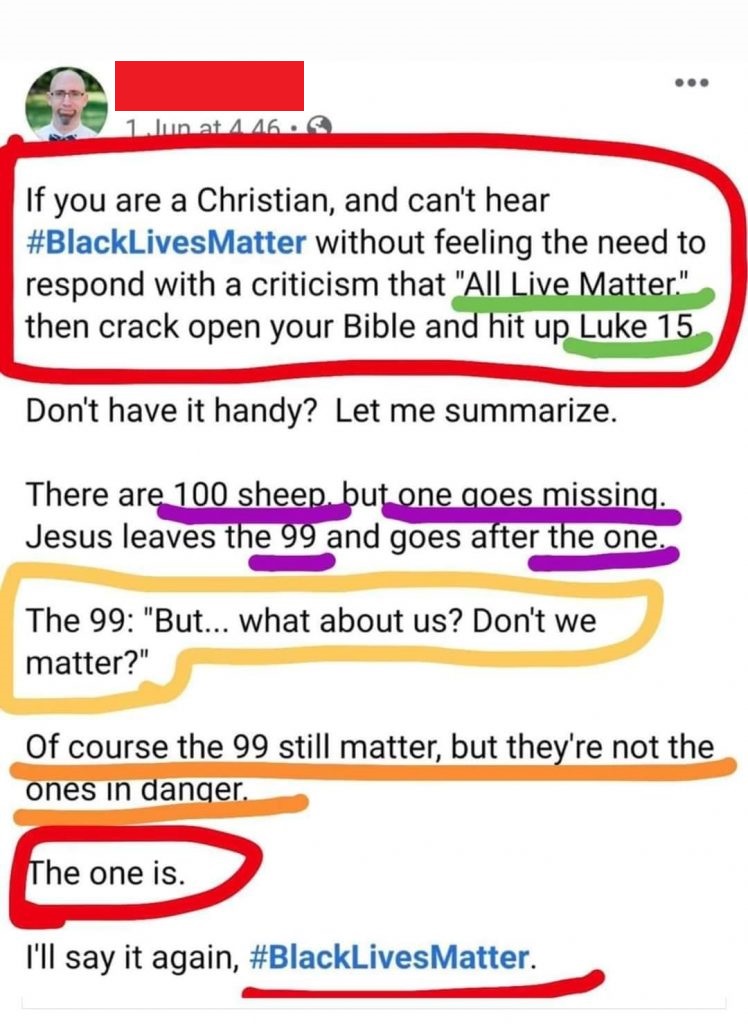Would Jesus Say “BlackLivesMatter”?
I came across the post below a while back regarding a passage from Luke 15. In this passage, Jesus tells a parable about a shepherd who leaves his flock of 99 sheep because one of them has gotten lost. This person read the passage in the midst of all of the recent racial strife in America and saw in it what he thought was confirmation for a current movement. But, as I’ll show, that is not what this passage is about at all. I’ll also show that there are even better verses to use in order to make his point. And, I’ll attempt to teach some important concepts to keep in mind when reading any book or letter or article. Especially the Bible
Some Guidelines For Interpretation
If our goal is to accurately apply the life and words of Jesus to our own lives, the first step is interpretation. We have to determine what he meant by what he said or did before we can then apply it to our modern situations. So, here are some things to keep in mind when interpreting a text.
Context Matters
Bible chapter and verse notations are a great addition to the text because they help us jump around quickly to get to specific passages. Notice, though, I said “addition”. This notation wasn’t there until a few hundred years ago. When Luke wrote his gospel, he didn’t assign it chapters and verses. These were added much later.
While the chapters and verses do help us jump around, they can also sometimes give us a bit of tunnel vision when we come to read a passage. For the most part, the Bible authors organized their writings with specific goals in mind. In the case of the gospels, three of them (Matthew, Mark, and John) are organized more by ideas than chronology, for example. Luke appears to have organized his gospel mostly by timeline.
Here’s a good example of how context matters. Let’s say as an employee, you email your supervisor regarding one of your coworkers. And let’s say your supervisor doesn’t take the time to read your email but lands on one specific sentence where you write “she killed it!”. What does that mean? Does it mean she squished a bug? Does it mean she got rid of a snake that had made its way into the outdoor break area? Or maybe there was a big project your team was working on and this employee performed at a really high level. The only way to know what “she killed it” means is to read what comes before and after the statement.
As for the letters, they are written the same way we might write an email. If you’re a supervisor, you might write an email to the people you manage letting them know of a new policy. Or addressing a situation that has come up at work. And, if you’re an employee, you might write an email to your supervisor letting them know of a situation that you feel he or she needs to address. In any of these examples, you organize your thoughts in a way that best gets the point across that you are trying to make.
Don’t Read Into A Text
Everyone who has heard of Jesus has a picture in their head of who Jesus was and what he would stand for. And, most people who claim to follow Jesus think that Jesus would be on their side of a given issue. This just makes sense. If you proclaim to be a follower of Jesus, that means you are trying to act like him. You think you have him figured out. So, when someone puts up a statement like “Jesus would/wouldn’t do (insert current hot button issue)” or “Jesus would/wouldn’t say (insert current popular slogan)” and we disagree with that statement, the thing we tend to do is go look for verses that counter the given claim. Myself included, by the way. With this passage in Luke 15, I saw it and got a little rankled because I knew it was a clear misinterpretation. My instinct was to turn to the passage already thinking the guy was wrong. This is bad! If I want to interpret a passage correctly, I have to try my best to come to it humbly with a mind to learn and not focused on disproving the person I disagree with.
The Parable Of The Lost Sheep

Now, let’s have a look at the parable in question, It appears in Luke 15:1-7.
Now the tax collectors and sinners were all drawing near to hear him. 2 And the Pharisees and the scribes grumbled, saying, “This man receives sinners and eats with them.”
Luke 15:1-7 (ESV)
3 So he told them this parable: 4 “What man of you, having a hundred sheep, if he has lost one of them, does not leave the ninety-nine in the open country, and go after the one that is lost, until he finds it? 5 And when he has found it, he lays it on his shoulders, rejoicing. 6 And when he comes home, he calls together his friends and his neighbors, saying to them, ‘Rejoice with me, for I have found my sheep that was lost.’ 7 Just so, I tell you, there will be more joy in heaven over one sinner who repents than over ninety-nine righteous persons who need no repentance.
Remember, when trying to get the meaning of a passage, it is important to look above and below it. Even better if you read entire sections above and below it. The parable itself is vs 4-6. But, it’s important to see who Jesus’ audience was in order to understand the message. In v1 it tells us that the tax collectors and sinners were gathering to Jesus. And, the religious leaders didn’t like that (v2). Sinners (like prostitutes, thieves, and shady businessmen) and tax collectors were looked at as unclean and were to be avoided in their eyes. These people might as well have had communicable diseases to the righteous people of the day.
Jesus tells the parable to the religious leaders regarding a lost sheep. The author of the tweet says that the sheep went missing. In Jesus’ words, this sheep was lost. It had wandered off and broke away from the rest of the flock. And, as the author of the tweet says, the shepherd left the 99 to go after – and find – the one sheep. Afterward, he carried the lost sheep home and threw a big party to celebrate the finding of his lost sheep.
Who Are The Sheep?
The key to interpreting this parable is understanding who the sheep are. You have two different sheep – the group that stayed with the shepherd and the one who got lost. To the author of the above post, the one who got lost represents black people who have felt unloved, uncared for, and feel like they aren’t shown to have as much value as others.
There are a few other weighted and politically tainted terms I could toss in there that are attached to the Black Lives Matter movement, but I won’t because, in fairness, that would take some assumption on my part on where the author stands on certain issues. I just want to address the passage and tweet at hand.
To the author, the other 99 sheep are the ones who are safe, protected, and accepted already. They represent the cultural majority. In America, these would be white people.
The good news for us is Jesus makes it perfectly clear who the sheep are in this parable. We don’t have to do a lot of work to figure this one out. He tells us in verse 7 when he says “Just so, I tell you, there will be more joy in heaven over one sinner who repents than over ninety-nine righteous persons who need no repentance.” (emphasis mine).
So, according to Jesus’s words at the end of this parable, the one lost sheep isn’t some cute, cuddly, wholely innocent little lamb who got separated and left behind. He wasn’t beset by predators and attacked and that’s why he wasn’t with the rest of the flock. No, the sheep in this parable is a sinner. Someone who is lost because they aren’t following the shepherd. They wandered off. Turned their back on the flock and got left behind. The sheep getting lost was because of free will choices on their part. Not because they were held back by something else.
In this parable, the other 99 sheep represent the Pharisees and other religious leaders. Jesus refers to them as “righteous people who need no repentance.” This isn’t what Jesus thought of them by the way; this is what they thought of themselves as. According to Jesus, no one is righteous on their own merits. But, the Pharisees saw themselves as perfect, holy, and righteous. So, Jesus was telling them that they should be excited when people who have turned to a life of sin come back to a right relationship with God. Righteous people were already doing God’s Will. And, if we are saved, we should be excited when one more joins the flock. Not jealous.
Further Context
Earlier, we talked about looking at the passages around the one that we are studying for further clues on how our passage fits into the bigger picture. This parable is a great example of that. As we’ve shown, this parable is about the effort God goes through to save sinners and the celebration that happens when someone is saved. As further proof that this is the message, there are two more parables in this chapter of Luke with the same message.
Directly after the parable of the lost sheep comes the parable of the lost coin (Luke 15:8-10) – where a woman loses a valuable coin in her house and turns the house upside down until she finds it.
The parable that really struck home to the Pharisees was the parable of the prodigal son (Luke 15:11-32). In it, a man has two sons. One is loyal and stays by his side all of his days. And the other is obstinant, asks for his inheritance early, and takes off. He quickly squanders his fortune on wine, women, and the party lifestyle. Eventually, he has to come crawling back to Dad. Dad throws a big party for his return because he thought his son was lost, but now he’s found. The loyal son gets upset because he had been faithful all these years and Dad had never thrown such a party for him.
In every one of these parables, the person or thing that got lost – and that the “finder” celebrated over – was not innocent. They got lost because they messed up. But, the finder still celebrated the fact that they came back in spite of walking away. This isn’t a passage about Jesus caring for the marginalized or the oppressed or the victims of injustice. It’s about what God will go through to draw us back to him and how much joy there is when we do so.
Would Jesus Tweet #BlackLivesMatter?
One of the things that we see all too often in the social media era is the use of hashtags, borders around our profile pictures, reposting of slogans, and pictures of us wearing t-shirts with certain slogans or people on them. This is a way for us to let other people know where we stand on a given issue. Many people also take it to the level of exclusion if you don’t participate. If you don’t say a certain phrase or wear a certain hat, then you’re not one of us. And that makes you a bad person who doesn’t care about the things we care about. Because you won’t repeat our phrase or wear our hat.
Just like the parable he cites, the person who composed this tweet has an audience he is speaking to – it’s Christians who won’t say “Black Lives Matter”, but instead say “All Lives Matter”. The author feels that people should say “Black Lives Matter” because Jesus taught it in the parable of the lost sheep (which – as we have already seen – is a misinterpretation). And, if you won’t say “Black Lives Matter”, then you don’t care about the pain that the black community in America is going through.
So, would Jesus have said “Black Lives Matter”? In the way that the author wants Christians to say it, I think the answer to that is no. But, it isn’t because Jesus doesn’t think black lives matter. The reason Jesus wouldn’t say “Black Lives Matter” is because Jesus was way too smart to get caught up in sloganeering. In fact, he was faced with similar challenges time and time again during his ministry. On several occasions, the Pharisees, Sadducees, lawyers, and scribes – being the educated, self-righteous, political leaders of the day – tried to trap Jesus and make him say certain things that would either incriminate himself or make him take a side on a certain matter.
One instance of this came when they asked him if they should pay their taxes to Caesar (Matthew 22:15-22, Mark 12:13-17, Luke 20:19-26). Saying yes – like the Herodians wanted him to say – would mean Jesus was on the side of the oppressive Roman government. And the Pharisees would turn the Jews against him. Say no – like the Pharisees wanted him to say – and the leaders would drag him in front of the Roman governor on charges of treason. Jesus didn’t take the bait, however, and gave them an even better answer.
Another instance comes in John 8:2-11 when the Pharisees brought a woman caught in the act of adultery before Jesus to see if he would condemn her to death – as is written in the Law of Moses. Yet again, Jesus was too clever to say what they wanted him to say. Instead, he saw right through to their intent and gave a better answer.
There are many more examples of the Jewish leaders trying to get Jesus to say certain things. I want to bring up one last instance that actually covers perfectly what Jesus would have done if someone wanted to hear Jesus say the “Black Lives Matter” slogan to show which side he was on. It starts in Luke 10:29 when Jesus and a lawyer talk about how to inherit eternal life. First, love God with all your heart, soul, strength, and mind. And, second, love your neighbor as yourself (v27).
When the lawyer asks who his neighbor is, Jesus tells the parable of the Good Samaritan (Luke 10:30-37). In this parable, Jesus sets a pretty high bar for “who my neighbor is”. It’s everyone who isn’t me! It’s people who look different than me, people who grew up different than me, people who believe differently than me. And, especially people with who I disagree or who might have animosity towards me.
Why should I love people who are different than me in the same way I love myself? Well, it isn’t because of something they can do for me. It’s simply this – that God has created everyone in his image. Regardless of how messed up we are, what color our skin is, what gender we are, what political parties we align ourselves with, or what station we have in life, we all have value and deserve to be treated as such. It’s been this way since the beginning (Genesis 1:27).
See, Jesus wouldn’t stand in some rally, waving signs, and chanting slogans of support – only to go back to his normal life after the rally was over. He would visit with and care for those whom he saw were suffering. The way that I am to apply this parable in the current situation is not to turn a deaf ear to those who are crying out for help. It doesn’t matter what I think about how people ended up in the situations they are in or whether or not I disagree with a politicized message behind a phrase. The fact remains that some people do feel less than. And the first step for me to help in the healing is simply to listen and not pass them by on the side of the road.
So What?
You may wonder why it is worth correcting an interpretation if I agree with the overall take-a-way. First and foremost because we owe it to the author to interpret what he was trying to say in an accurate way. When the original authors wrote down the books of the Bible, they had a specific idea in mind when they wrote down what they wrote down. They weren’t trying to be ambiguous, or leave things open. The first thing you have to do before you can get an application from something is to interpret correctly what the original author meant.
Let’s say I leave a note for my son that says “be sure to take the trash out tonight because the garbage truck is coming tomorrow morning”. And let’s say his only takeaway from that note is “garbage trucks pick up trash” – which is a true statement. But, he missed the point of my note. And, while he has come to the realization that garbage trucks pick up trash, our trash is still piled up next to the house because he didn’t take it out. So, he didn’t get the original message I was trying to get across to him.
Another thing to consider is that it is unethical to take a text that attempts to teach one lesson and twist it to teach another. As Christians, we believe that the Bible is God’s word. This is twisting God’s word and modeling a dangerous interpretive method.
So, can this passage be applied to the #BlackLivesMatter movement? I think the answer to that is no. Would Jesus even use the phrase? Again, I think the answer to that is no. The more important question is would he show black people that their lives do matter? To that, I say he most certainly has.
Share This Story, Choose Your Platform!
latest video
news via inbox
Subscribe and never miss an update!








It’s unfortunate how often scripture gets taken out of context. I do agree that Jesus would see past getting caught up in slogans and picking sides. I feel as though when Jesus sees the oppressed he’d rather do something about it then just tweet a slogan. Actions speak louder.
Jesus was so wise! I pray every day I can be wise like him and not get caught up in heated debates on important issues.
It’s important to remember to include context with scripture. When scripture is used it is often taken out of proportion. Jesus would do His best to help the people rather than post a hashtag.
Depending on who was around him, he would definitely have something to say. But he wouldn’t let himself be someone’s pawn.
I disagree,to be honest I think Jesus would understand the political context of the word black lives matter and understand that when people said all live matter they were trying to undermine a movement due to white guilt, America has a problem -its a country built off the back of inequality and injustice, something Jesus does not stand for.He understood the power of words, symbols, solidarity.Let two or three gather and all of that. So yes I think Jesus would probablly say black lives matter, because while the writer of this article fails to see the imapct of social media in political movements today, it does the same thing feeding the poor does , only the word is spread and voices of innocent black people are not silenced.